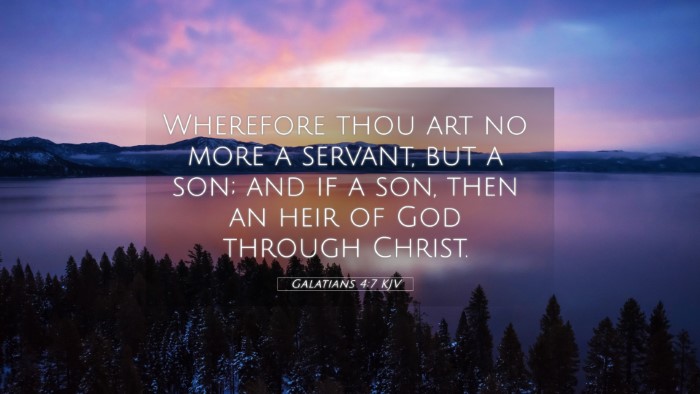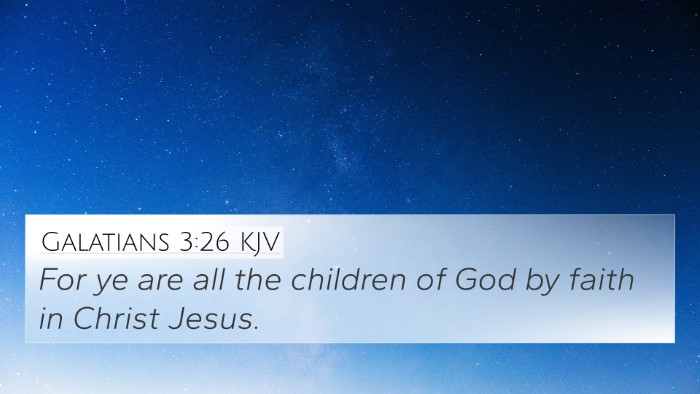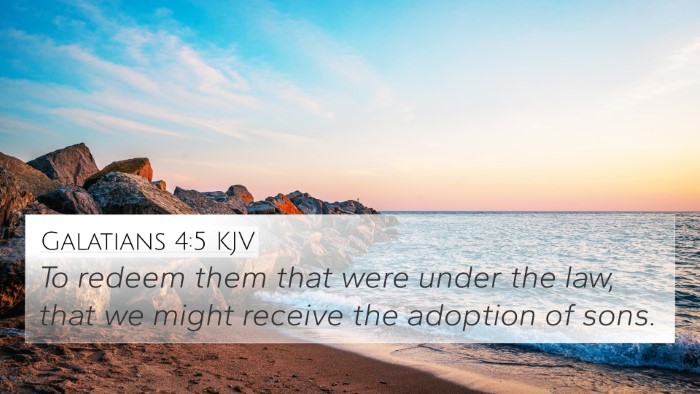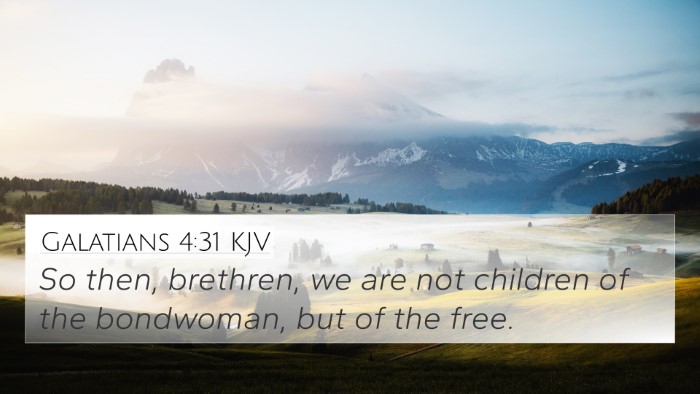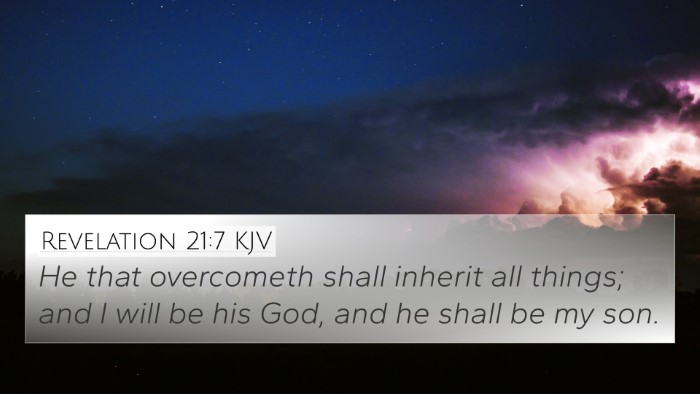Understanding Galatians 4:7
Bible Verse: "Therefore you are no longer a slave, but a son; and if a son, then an heir of God through Christ." - Galatians 4:7
The verse Galatians 4:7 is a profound declaration of the believer's new status in Christ. To fully grasp its meaning, let us explore insights drawn from esteemed public domain commentaries such as those of Matthew Henry, Albert Barnes, and Adam Clarke.
Verse Analysis
This verse encapsulates the essence of Christian identity and inheritance. In it, Paul contrasts two conditions: being a slave and being a son. The transformation from one state to the other is pivotal to understanding the implications of grace.
Commentary Insights
- Matthew Henry: Matthew Henry emphasizes the radical change in believers' status from slaves to sons. He explains that this change signifies not only liberation from the law but also the acceptance into God’s family. It reflects on the believer's privileges and rights as a child of God, including the assurance of being an heir to God’s promises.
- Albert Barnes: Albert Barnes focuses on the significance of being an heir of God through Christ. He argues that while slaves have no rights or inheritance, sons will inherit their father's estate. Therefore, through Christ, believers become partakers of divine promises and blessings, enjoying the full rights of children in God's family.
- Adam Clarke: Adam Clarke discusses the implications of this verse in light of ancient customs where adoption took a prominent role. Clarke observes that just as adopted sons were afforded the full rights and privileges of natural sons, so too are believers granted the right to claim God as their Father through faith in Christ. This transformation offers profound reassurance and identity to the faithful.
Thematic Connections
The verse connects deeply with several other biblical themes and verses. It speaks to the ideas of inheritance, sonship, and freedom from the law. Here are some pivotal Bible cross-references that relate to Galatians 4:7:
- Romans 8:15-17: This passage highlights the spirit of adoption whereby believers cry out "Abba! Father!" affirming their position as children of God.
- John 1:12: Here, it elaborates that those who receive Christ gain the right to become children of God, echoing the sentiment found in Galatians 4:7.
- Ephesians 1:5: This verse underscores predestination to adoption as sons, further emphasizing believers’ status and God's divine plans for them.
- 1 John 3:1: This verse reveals the love of the Father in allowing us to be called children of God, an affirmation of our new identity.
- Luke 15:21-24: The parable of the prodigal son illustrates the principles of sonship, forgiveness, and inheritance, directly correlating with the themes in Galatians.
- Galatians 3:26: Paul earlier states that believers are all children of God through faith, connecting directly to their status elaborated in Galatians 4:7.
- Hebrews 2:10-12: This passage strengthens the concept of Christ not being ashamed to call believers brothers, illustrating an intimate familial connection.
- Philippians 2:15: In this verse, believers are reminded to shine as lights in the world, reflecting their identity as children of God.
- Colossians 3:1-2: It encourages believers to set their minds on things above, consistent with their status as heirs of God.
- Revelation 21:7: This promise that the one who overcomes will inherit all things indicates the future fulfillment of being heirs.
Application & Interpretation
Galatians 4:7 invites believers to grasp their identity in Christ fully. It encourages an understanding that receiving Christ not only liberates from past constraints but also elevates one into a place of honor within God’s family. This status transformation embodies themes about:
- Freedom: Understanding the liberty that believers have from the law.
- Heirship: Acknowledging the rights and blessings that come as co-heirs with Christ.
- Identity: Embracing the new identity as children of God.
In light of this verse, believers are encouraged to explore tools for Bible cross-referencing such as Bible concordances or cross-reference guides to delve deeper into how scripture interconnects with itself. Understanding these connections enhances the interpretation of individual verses and enriches the overall experience of Bible study.
Conclusion
Galatians 4:7 stands as a key scripture for understanding the Christian faith's tenets regarding sonship, freedom, and inheritance in God. By considering cross-references and thematic connections, believers can grasp the profound nature of their relationship with God through Christ with greater clarity. This exploration not only deepens faith but also enhances the understanding of biblical themes and teachings.

